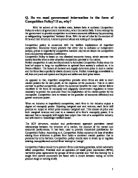Markets may sometimes fail, but this does have reasons, which can be put into the following five categories; lack of competition, existing externalities, missing markets, factor immobility and the issue of inequality in society.
When a film has the chance to dominate a market it will restrict supply in order to raise the market price. As consumers are unable to buy as much as previously, this leads allocative inefficiency. Pareto insisted allocative efficiency was where price was equal to marginal in every market, and this could only be achieved in perfect competition.
When resources have allocative efficiency the signs delivered by the market mechanism are accurate, but in the case of prices, profits rarely represent actual costs and benefits to society of an economic activity. Typical examples include pollution, and while economists are trying to find solutions such as regulation, extended property rights, subsidies or taxes, one thing is clear government is essential.
Governments also exist to fill the gaps where markets do not, or can not exist, such as defence where the goods are non-rival and non-excludable and a free market would not be able to provide such public goods to a socially acceptable level.
In many cases factor mobility has the problems of occupational immobility where skills can’t be transferred and geographical immobility where jobs can’t be transferred, government can intervene here by doing things like training.
A final source of market failure shows that without government intervention, widespread and extreme inequalities are likely to emerge.
A final conclusion states that for both, an efficient economy and a society in which we want to live require some government intervention.
Why Would Public Goods Not Be Accurately Provided By A Free Market?
Public goods which are provided by the government are actually not goods, but services and these services are amongst those which are non-rival, non- excludable and non-rejectable.
Some goods can not be provided in a free market due to what economists refer to as free-rider problem. For these goods, the words “it pays not to pay.” apply, which is why these goods are provided less of in the free market, and voluntary contributions are sometimes asked for. Economics is basically that people respond to incentives and public goods have no incentives.
Services, like for example the fire service, it is non-rival under normal conditions, unless by some chance there was a mass spread of fire throughout a neighbourhood, causing the fire service to become rivalled, and it is unlikely that there will be any rejection of the service , but if there is it would be ignored.
In some cases, a good can have both, aspects of a private and public good. Many of these goods are a part of the grey are which are sometimes called quasi-public goods from which an example is road transport. There are a number of services which today are public goods, but in the past have been owned by private enterprise. Evidence of such things as plaques on old buildings so we know that the fire service was once a private enterprise. This kind of service is non-rival in normal conditions but just in the case of a mass town-wide fire would it become a rival service. Public goods are different from merit goods, as merit good are private goods but those which have external benefits whose consumption is promoted by the state. The Victoria & Albert museum fits into our definition of a public good as we see it is not rivalled. There are the grey areas in the public goods. A perfect example of this would be knowledge. Is knowledge a public good? By one person knowing something that doesn’t stop anybody else from knowing the same thing. As long as the knowledge is part of the public domain, no one can be stopped from leaning it. But not all knowledge is known. There are government cover-ups to all sorts of things causing an exclusion of knowledge.
In conclusion, we see that although the economist’s definition of a public good seems simple and precise, there are a few problems. The free-riders problem for one which explains that many socially desirable goods and services would be under provided in the private sector, as well as this there are many goods which only fit the definition of a public good, partially, and yet are treated as a public good. There is a simple answer to the question of can public goods be provided adequately in the free market, and the free-rider problem means that the free market would not be able to provide public goods.







